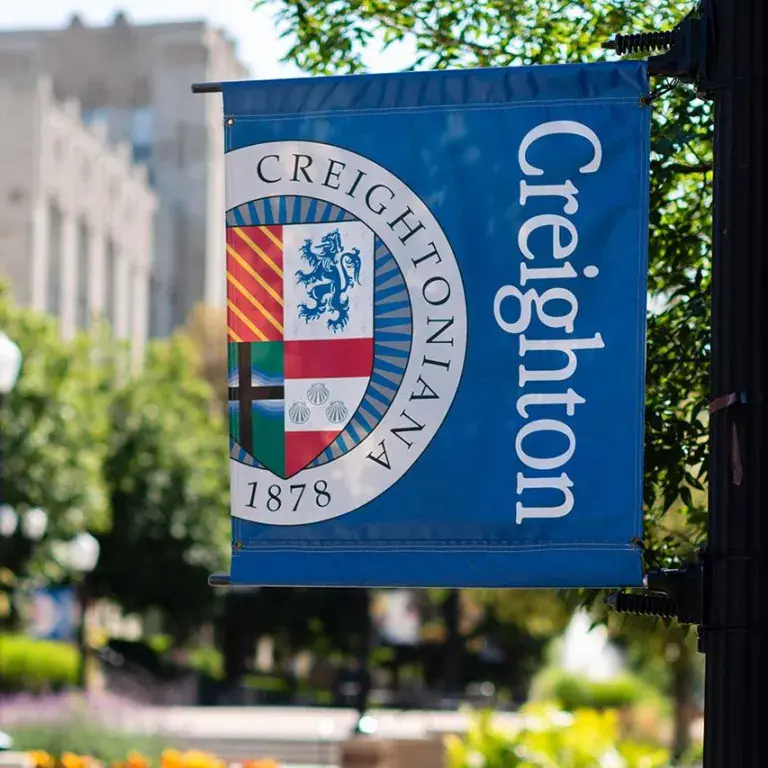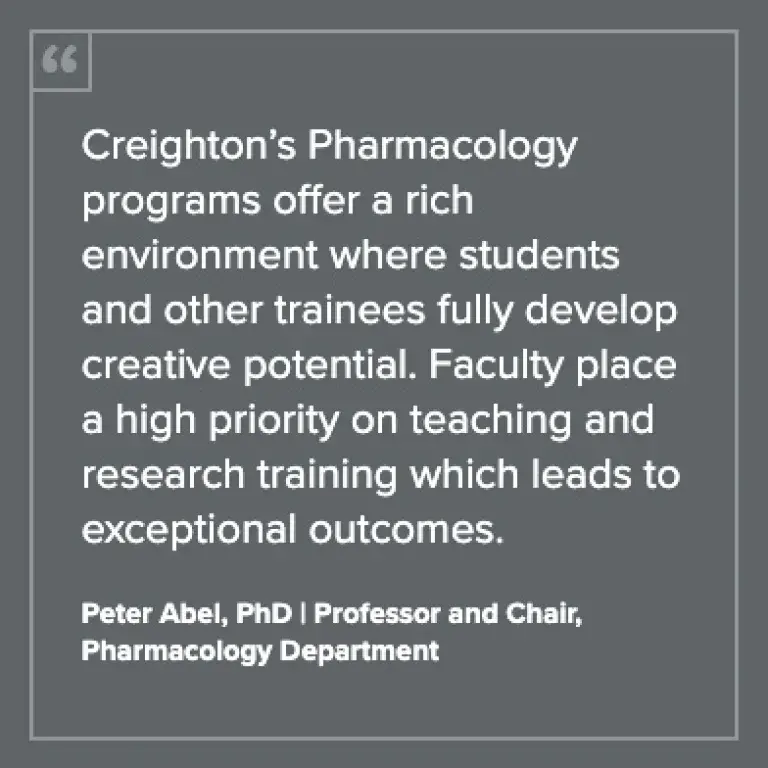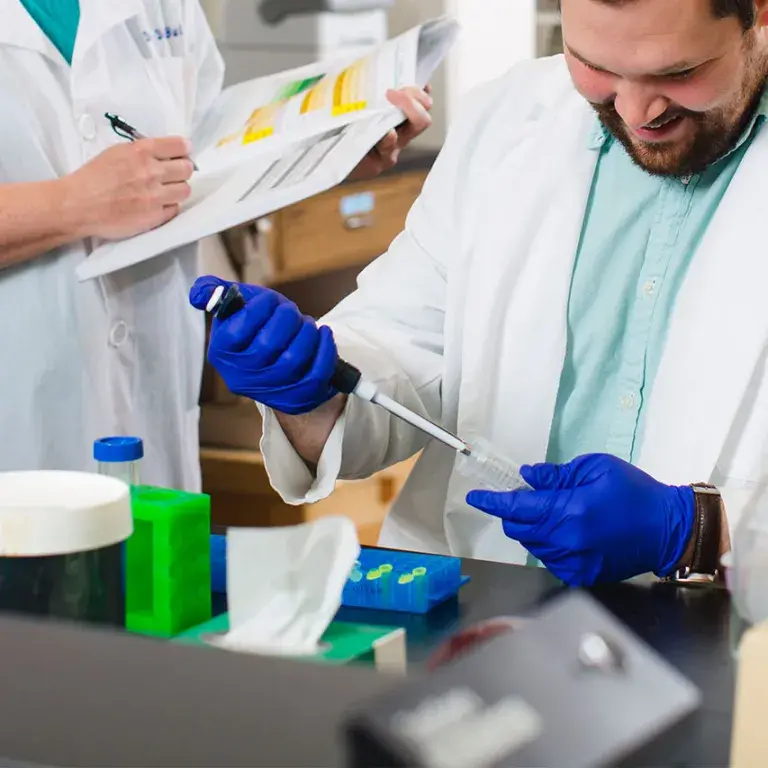
Pharmacology and Neuroscience (Master of Science)
Gain the knowledge and laboratory skills you need to effectively study drugs, research how they react with the human body and analyze how they impact complex systems through Creighton University’s Master of Science in Pharmacology and Neuroscience program. This interdisciplinary laboratory science program will give you a comprehensive understanding of the mechanisms of drugs and a strong basis for a career as an educator in pharmacology, research scientist, medical liaison or several other professions within the healthcare and pharmaceutical industries.
At Creighton, you’ll have access to the specialized equipment, resources and broad expertise of a large university, but with smaller class sizes. You’ll be able to use this to your advantage with opportunities for frequent one-on-one interactions with faculty and your primary mentor.
You can also expect to have regular interaction with other students in your cohort and our faculty members as you complete your pharmacology degree requirements. By focusing on a small group of students, our faculty can cover each topic in the program with more depth, which leads to a comprehensive, well-rounded education. You’ll gain a deep knowledge of physiology, learning about the mechanisms of drugs and their impact on biological systems at the molecular and genetic levels. You’ll also develop your critical thinking skills and discuss research ethics.
Research at Creighton is mission-driven, meaning your work will be part of a larger effort to find cures and treatments that will make a positive impact on the lives of others. Our students and faculty continue to research various human diseases such as:
- Neurological diseases such as epilepsy, autism, and schizophrenia
- Asthma, cancer, cardiovascular disease and pulmonary hypertension
- Substance abuse, stroke and birth defects
Your research passions are our priority
Creighton’s Master of Science in Pharmacology and Neuroscience can be customized to fit your interests and career goals. You’ll work with a major advisor and thesis committee to create a customized plan of study that culminates in your master’s thesis, which will be based on original research. Specialization areas include neuroscience and neuropharmacology, autonomic, cardiovascular, ocular, renal and exocrine pharmacology, neuroscience, immunopharmacology, neuropharmacology and toxicology.
Your professors will work closely with you—guiding your studies and acting as teachers, advisors and mentors throughout your degree and career. Many of our faculty members collaborate and work with students long after they earn their degree.
Our faculty reflect the complex scope of modern pharmacological research as they apply methods of systems and cell physiology, neuroscience, biochemistry, genetics, and cellular and molecular biology to better understand drug action. Their research includes diverse topics such as:
- G protein-coupled receptor signal transduction and regulation
- Control of neurotransmitter release
- Ion channel modulation and metabolism
- Molecular pharmacology of excitatory neurotransmission
- Environmental contributions to neuroplasticity and development
- Cardiovascular and CNS drug discovery



Program Details
Program Goals and Curriculum
Creighton’s Master of Science in Pharmacology and Neuroscience prepares students for careers in research and education in the field of pharmacology. It’s also excellent preparation for those interested in pursuing an MD or PhD. Studies are individualized—students in this program choose a concentration from numerous specialized areas of pharmacology.
To earn this master’s degree, you must complete 30 credit hours:
- Required Courses
- Foundational Science
- Neuroscience and Molecular Pharmacology Laboratory
- Research Rotations
- Introduction of Neuropharmacology
- Fundamentals of Neuroscience
- Biostatistics
- Responsible Conduct of Research
- Advanced Pharmacology (journal club)
- Advanced Neuroscience (journal club)
- Seminars
- Research Rounds in Pharmacology
- Pharmacology Seminar
- Master’s Directed Independent Research
- Master’s Thesis
Faculty
Creighton’s Pharmacology and Neuroscience faculty are involved in both teaching and research training of graduate students. Our faculty encourage a collaborative research environment that welcomes graduate students, postdoctoral fellows and research staff.
PhD and Master's Options
Pharmacology and Neuroscience PhD (90 credits)
- The courses required for the Master of Science in Pharmacology serve as the foundation for the doctorate program. PhD graduates are required to take some additional courses, attend additional seminars, complete extensive independent research and study, and write and defend a doctoral dissertation.
- Available on-campus.
Biomedical Sciences PhD (90 credits)
- Create an individualized degree based on your research interests under the guidance of Creighton’s talented faculty who lead the Doctor of Philosophy in Biomedical Sciences program. Possible topics range from cancer biology and neuroscience to gene regulation and more.
- Available on-campus.
Biomedical Sciences MS (30 credits)
- Completion of this biological science degree prepares individuals for research careers in academia, institutes, or industry. The programs employ a multi-disciplinary approach using our research, courses, and facilities to cater to the career needs and research interests of the individual student in diverse areas of study ranging from cancer biology and neuroscience to gene regulation and more.
- Available on-campus.
Admission Requirements
To be considered for admission to the MS in Pharmacology and Neuroscience program, applicants must:
- Complete an application and submit a $50 application fee
- Possess a bachelor’s degree in a related field with 3.0 GPA or higher
- Bachelor of Art or Science from an accredited college/university. Applicants should have some undergraduate training in the life sciences, but a STEM-based undergraduate degree is not required. In general, students with strong biology, chemistry, physics, engineering, computer science or mathematics backgrounds are most successful and encouraged to apply. Opportunities to remedy deficiencies in basic undergraduate courses exist in the first year of graduate school.
- Provide official transcripts from all educational institutions attended. Read more about sending transcripts here
- Submit a personal statement (see application for specific requirements)
- Submit three letters of recommendation from persons other than friends or family members
A personal interview may be requested in addition to the above requirements. The interview may be conducted in-person or virtually.
International students are welcomed into this program and F-1 visas will be supported upon admission.
International applicants must:
- Meet English language proficiency requirements
- Complete and submit a Certification of Available Finances Form through the Global Engagement Office if admitted
Tuition & Financial Aid
Tuition is waived for students accepted into Creighton’s Pharmacology and Neuroscience master’s program. Students also receive health insurance coverage.
Have questions? Email or call a friendly financial specialist at 402.280.2731 for any additional questions you may have.
Dates and Deadlines
The table below details the enrollment deadline and starting date of courses for the current academic year. If you have any questions about dates, deadlines, or application materials, please contact an admissions advisor for personalized assistance.
On-campus
- Apply by February 1
- Start classes in August




